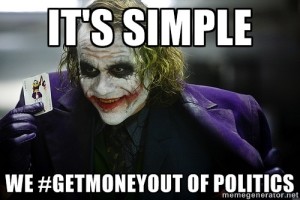The Federal Election Commission receives a lot of criticism these days, including from its own commissioners. But so too does Congress for the campaign finance laws it has passed (or, in some cases, not passed) and the Supreme Court for its rulings on campaign finance cases. Much of that criticism is founded on mistaken beliefs about the law, the Constitution, and about the effects of money in politics generally, but I want to address a different point today: the FEC’s critics should not denounce the Commission when their actual complaint is with the law the FEC is required to administer. Urging federal agencies to ignore the law just because you don’t like that law is advocating bad government, not good government.
Enter the Editorial Board of The Philadelphia Inquirer, which is never shy about its views on campaign finance regulation: it wants more of it, much more, from anyone willing to do the job.
Writing on the issue for the second time in as many months, the Board makes a passing, but telling, comment about the FEC, which it erroneously refers to as the Federal Elections Commission: “The FEC has not effectively reacted to the Supreme Court’s ill-conceived Citizens United ruling in 2010, which permits unlimited corporate donations to political campaigns, nor to other court decisions allowing secret money to flow into races.”
Leaving aside the Inquirer’s wholly inaccurate description of Citizens United, as corporations are still prohibited from giving to campaigns on the federal level, the FEC does deserve criticism for its slow response to Citizens United – failing to codify the 2010 ruling into its regulations until 2014. But eventually it did, and whatever criticism is warranted should not be aimed at the Commission as a whole, but at those commissioners who were slow to act because they personally disagreed with the Citizens United decision. That is clearly not what’s bothering the Philly Inquirer’s Editorial Board. Tipping its hand by deriding the decision as “ill-conceived,” you can tell the Board, like many other so-called “reformers,” is simply unhappy with Citizens United and wants the FEC to write regulations to blunt the ruling’s impact.
I don’t believe that the Philly Inquirer Editorial Board wants the FEC to openly defy the Court, but I do believe they want it to subtly undermine and circumvent the Citizens United decision. That desire leads to criticism of the FEC, not – contrary to what its critics would claim – for failing to do its job, but rather for insisting on it by refusing to write regulations that conflict with legal precedent.
This impulse towards heavy regulation regardless of an agency’s legal authority to act or capability to act responsibly has damaging effects long before we get to the point of tyrants swearing off Marbury v. Madison. We’ve already seen, as in the IRS scandal, some of what can happen when activists and unscrupulous politicians pressure an agency to regulate outside its purview and play the role of campaign speech police: inexcusable and widespread violations of American citizens’ rights.
This, regrettably, doesn’t concern the Inquirer’s Editorial Board. If the FEC won’t do the job, get someone else: “Meanwhile, the Internal Revenue Service has done a poor job of determining whether nonprofit groups are real charities that may legally withhold donors’ names or fronts shielding secret contributors. And the Securities and Exchange Commission shot down a rule requiring publicly traded corporations to disclose political spending.”
It should go without saying that this reckless attitude towards who in government has the power to weaken our First Amendment rights – applied first to the FEC in relation to Congress and the Supreme Court, and then to other federal agencies in relation to the FEC – is dangerous. Empowering non-expert agencies (like the IRS or the SEC), or agencies that lack institutional checks on power (the FEC, for example, is a six-member Commission with no more than three members coming from any one political party, as an intentional safeguard to protect the agency from being abused for partisan gain), to achieve short-term regulatory goals will backfire. “Reformers” should remember that the enemy of your enemy is not always your friend.

Criticism of the FEC is sometimes fair and sometimes foul, but routinely misguided. Asking it, or any other agency for that matter, to “clear[] out the undue influence of money” without the assistance or approval of Congress and the Supreme Court is not a recipe for reform. It will, in the end, lead to a worse political system than any the Inquirer fears from “money in politics.”












